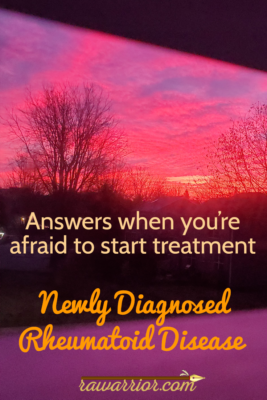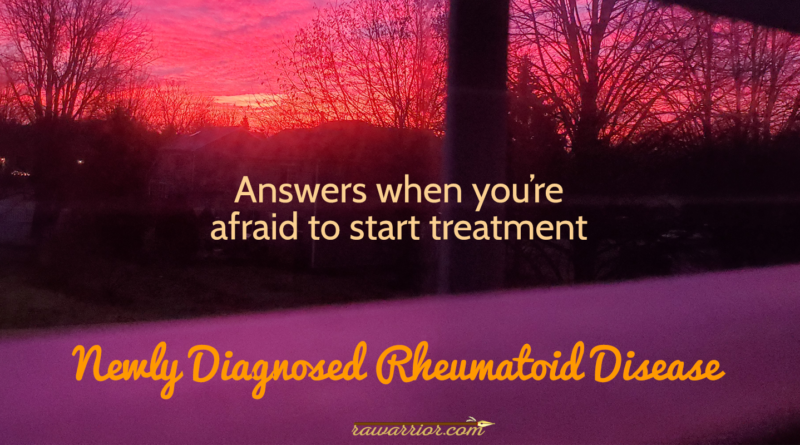Newly Diagnosed RA and Afraid
Letters from newly diagnosed RA patients
As newly diagnosed RA patients find my website and write me letters, two things happen: 1) My heart is heavy for another life affected by this horrible disease. And, 2) I gather more information to add to the tens of thousands of experiences already shared with me.
Of course letters from rheumatoid disease veterans are also invaluable to learning about disease patterns and responses to treatments. Look for more on those topics coming soon in coverage of the recent ACR meeting.
Because the themes are SO common, I’m sharing this recent letter from a man newly diagnosed with RA / RD and my response to him (I changed his name):
Dear Michael, first off, thank you for writing! The many letters written by warriors like you have also been a tremendous benefit to me—helping me learn significantly more about the disease.
Newly diagnosed RA bewilderment
The letter on newly diagnosed RA continues:
 I could write a blog post (and maybe a book!) in response to just this part of the letter! The most important things to tell you, Michael:
I could write a blog post (and maybe a book!) in response to just this part of the letter! The most important things to tell you, Michael:
1) You can do everything right, and still become a victim of rheumatoid disease. A word I seldom use—victim—but I intend to emphasize the unfair, one-sided nature of this disease. It’s never the fault of the person who is stricken, who is often doing all the right things.
2) Onset patterns vary. Many medical professionals tend to doubt this particular pattern, but it’s very real. Every joint that you knew about—and some that you didn’t—refuses to work properly and responds with intense pain.
Treatment decisions and newly diagnosed RA
Here’s more of Michael’s letter. Read all the way to the end! These are things that thousands of people have written to me about.
Without too much technical talk here, someone has given Michael bad information! With RD, the immune system is malfunctioning—that’s correct. But methotrexate (or other DMARDs) doesn’t stop it from working. It partially suppresses its activity. I’m sure Michael’s friends meant well, but they left him with the wrong impression that the medicines are more dangerous than the disease.
Truth about treating newly diagnosed RA
I started writing this blog post responding to Michael’s letter just after returning from the ACR meeting (yet another surgery delayed me). After a decade of attending these meetings, we still see new evidence on the value of early treatment in newly diagnosed RA—and the sad consequences of treatment delays.
1) One poster by a group from Hong Kong found that long term functional loss in RA can actually be prevented if remission is achieved early and sustained.[1] This study is great news because the disease usually does slowly progress, even in those who do respond to treatments.
2) A 2014 review of Treat to Target studies confirmed the ”window of opportunity” in treating newly diagnosed RA / RD.[2] Early aggressive treatment improves all types of outcomes of the disease.
This shows early and aggressive treatment is still the best bet to fight the disability and early mortality that the disease can bring.
Are the medicines scarier than the disease to you? #rheum Answers to Newly Diagnosed RA/RD Click To TweetYou might also like to read:
- The ostrich article: Can I Delay Treatment for Rheumatoid Arthritis? part 1
- Wait to treat RA? Can I Delay Treatment for Rheumatoid Arthritis? part 2
Newly diagnosed RA — BOTTOM LINE
Michael asks, “Honestly, is it worth trying or not?”
Honestly? I would be much more afraid of what the disease can do to me than the treatments for it. I say that because I’ve read thousands of medical studies about RD and its treatment. I say that after communicating with tens of thousands of people with RD. But I also say it because my disease wasn’t treated properly early on and I have suffered a lot of damage and disability as a result.
WHAT DO YOU THINK? HAVE YOU SEEN THE DIFFERENCE IN EARLY OR LATE TREATING RD? ARE THE MEDICINES SCARIER THAN THE DISEASE?
Recommended reading
- Surgery, Stories, and Feet amid Stubborn Rheumatoid Disease
- Accomplishing Thankfulness via Thorough Commitment
- The Pursuit of Happyness When Part of Your Life Is Called Rheumatoid Arthritis
FOOTNOTES
[1] Chow E, Cheng I, Tam L, Hong Kong C. Impact of Achieving Early-sustained Remission on Preventing Long-term Functional Loss in Patients with Early Rheumatoid Arthritis [abstract]. Arthritis Rheumatol. 2019; 71 (suppl 10). https://acrabstracts.org/abstract/impact-of-achieving-early-sustained-remission-on-preventing-long-term-functional-loss-in-patients-with-early-rheumatoid-arthritis/
[2] Monti S, Montecucco C, Bugatti S, et al. Rheumatoid arthritis treatment: the earlier the better to prevent joint damage. RMD Open 2015;1:e000057. Accessed from: https://rmdopen.bmj.com/content/1/Suppl_1/e000057.full doi:10.1136/rmdopen-2015-000057





I had my first symptoms in May 2015 (just turned 34.) I was diagnosed in August 2015 and started on methotrexate immediately. I have been on it weekly ever since. So far, I have no joint damage showing up on my x-rays. I have minimal pain most days and take no other meds for RA (except occasional NSAIDs.) I am really glad I started methotrexate right away. In the beginning, I had mild nausea after my weekly dose. But now I don’t really have any side effects. Once in a while, the next day I will be in a slight fog…but nothing too awful. Possible long term side effects can be scary to think about but the thought of doing nothing was scarier for me. I should add that I was lucky to be diagnosed quickly. I had an anti-ccp of almost 200 so that helped get the diagnosis.
Thanks for taking time to share, Jill. I think your comment will be helpful to many patients in the years to come.
I was lucky enough to find a great Rheumatologist who told me we need to be aggressive in our treatment. She said we were going to get to know one another very well. She was right! It is too bad insurance companies dictate which medicines you have to go through before they will pay (like methotrexate). I finally made it to Rituxan (biologic) which has put me in remission for Lupus and has lowered my inflammation numbers significantly for my RD. Yes, the side effects scared me, but quality of life won.
I wish everyone new to RD a safe journey in finding out what works for them.
Michael and other warriors please realize that yes, the drugs sound daunting, but as Kellie said, you have to see what the outcome might be without them. I myself failed with Methotrexate, but my rheumatologist continued on with other drugs available. I did well with a combination of Arava and Plaquenil for many years. Eventually the disease progression came to the point I was getting very disabled. I had to add Humira. Talk about scary possible side effects. It took over a year for me to agree to take it. FOR ME it was like a miracle. Eventually I was able to drop the Plaquenil. I have been on this regimen for 3 years now. Who knows how long it will work.
Short story..long hahaha. Yes all these drugs sound scary, but I am so thankful that we have them and through the continuous tenasity of people like Kellie the world is being educated and RD is being recognized for the disease it is. Research is picking up and new drugs are being developed.
Thank you Kellie.
Let me add my voice to those who advocate early treatment. I began to show symptoms in 2009 and I didn’t have insurance at the time so it was hard to deal with. When I finally did get a rheumatologist (about 6 months later), I was in pretty bad shape, barely able to walk. They immediately put me on prednisone plus methotrexate and plaquenil. I eventually stepped down (and quit) the prednisone as the other two drugs took effect. Now, 11 years later I have had a few flares, but mostly I have been in a medicated remission (asymptomatic, no pain, full range of motion) thanks to these drugs. I have had no side effects from either drug. None. I see the rheumatologist 3 times a year to get a check up and blood work, get a bone density scan every 3 years and see the eye doc twice a year (to monitor plaquenil side effects, if any). I try to keep my stress levels low and eat well and exercise (never enough, though). Recently I went to a more concentrated work schedule (3 days: 7 hours+14 hours+14 hours) that caused so much stress after 3 months that I had a flare. Once I realized what was happening, I immediately went back to my old schedule. I’m still dealing with the effects (morning stiffness comes and goes now) but I am holding off on upping the meds for now to see if I can get back to good with other measures. My point being that nothing is perfect, but doing nothing is the worst option. Once you get on the meds that work for you, then each element of your life now has to be monitored and tracked to see how each element is affecting your RD. It’s a lifelong dance but I believe its the only way to have the best life with the least amount of medication. Because at the end of the day, the disease is bad, the meds are not great, but they hold the disease at bay and help you live longer with less pain. I am taking less of both meds than when I first started because I got the food/exercise/stress elements to the best levels I could tolerate and experimented with the doses to see how much I really needed to live pain-free.
Thank you Kelly Young for your tireless advocacy and education for RD. RA Warriors really helped me 11 years ago and I am so grateful!